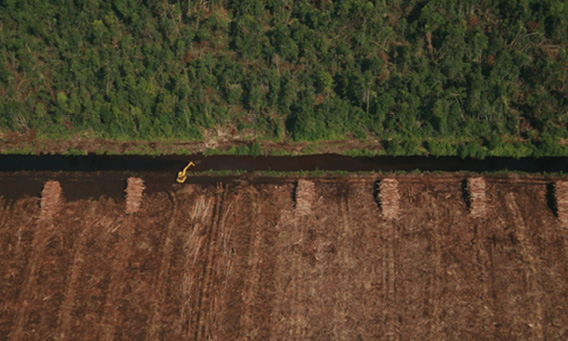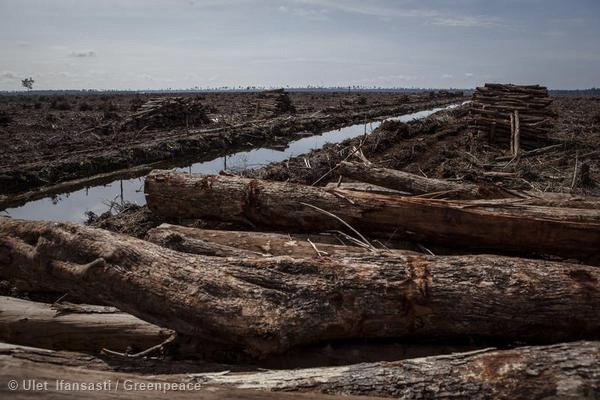
Peat drainage canal and stacks of MTH harvested from forest clearance by APRIL wood supplier PT. RAPP in Kampar peninsula. Some CITES-protected ramin trees were “saved” and left standing. Photo taken by Eyes on the Forest at N°17’52.36” E102°43’22.29” on 10 February 2012.
Indonesia’s second-largest pulp and paper producer has announced a new sustainability policy it hopes will win it the good graces of NGOs like Greenpeace, which has campaigned to get the company’s customers and financiers to suspend contracts and not renew loans due to its destructive environmental practices.
In a press conference in Jakarta today, Asia Pacific Resources International Limited (APRIL) introduced an updated Sustainable Forest Management Policy, known as SFMP2. The policy replaces APRIL’s SFMP1, announced last year but without the support of Greenpeace and other key stakeholders because it did not prohibit deforestation or clearing of carbon-rich peatland.
While the previous policy banned clearing of land identified as high-conservation value (HCV), a term that applies to some forests, the new one extends to high-carbon stock (HCS), which generally defines any forest more robust than shrubland.
The SFMP2 also protects carbon-rich peatlands, unlike the previous policy, and prohibits land clearing effective immediately. The SFMP1 allowed deforestation until the end of the decade.
“In a nutshell, I can tell you that the SFMP2 is all about no deforestation, no new development on peatlands and no compromise on our commitment to conservation and community,” APRIL President Praveen Singahavi said at the event.
Greenpeace gave APRIL, which has long been one of the biggest corporate drivers of deforestation in Sumatra, tentative plaudits.
“We commend APRIL for agreeing to end its deforestation, although we will be watching closely to make sure that today’s announcement leads to real change on the ground,” said Greenpeace campaigner Bustar Maitar, who posed for pictures at the event with APRIL executives such as Anderson Tanoto, a son of the founder of APRIL’s parent company, Royal Golden Eagle (RGE).
“I believe APRIL will make this happen,” Bustar said.

Piles of rainforest logs next to a drainage canal in Nov 2014. Photo courtesy of Greenpeace
The SFMP2 extends to all pulp companies under RGE’s control, including Toba Pulp Lestari, Asia Symbol and Sateri, and Greenpeace is suspending its campaign against APRIL while they implement it.
While the new policy prohibits new clearing on “forested peat,” it mentions the possibility of “development options for non-forested peatland.” A Peat Expert Working Group will be established to advise the company on that and other matters.
While APRIL must immediately cease clearing HCS forests and forested peat, it can still harvest felled logs until the end of this year, at which point all of its mills must source plantations rather than natural forest.
Environmental group the World Wide Fund for Nature (WWF), another critic of APRIL’s initial policy, also welcomed the announcement yet stressed that it would keep an eye on the company.
“We ask APRIL to always respect indigenous peoples’ land rights and seriously continue its efforts to resolve social conflicts,” said Aditya Bayunanda, WWF-Indonesia’s forest commodity market transformation leader.
“WWF will continue to work with other civil society organizations to monitor and assess the consistency of APRIL to this new commitment.”

A corridor of high conservation value forest in a pulp and paper plantation in Riau. Photo by Rhett A. Butler
Greenomics, a local NGO, criticized the SFMP2 for what it perceived as a weaker commitment via a change in wording regarding the protection of legally recognized HCV areas spanning 250,000 hectares, although the SFMP2 states that APRIL will “actively protect HCV and HCS areas.”
“We are questioning this point based on previous evidence that APRIL tried to propose the revision of workplans to the Ministry of Forestry to change the status of HCV areas into plantable areas,” Greenomics Executive Director Vanda Mutia Dewi said.